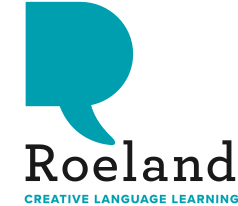Live on the radio! Airwaves, and how they trigger our students to speak a foreign language.
A quiz, a news bulletin, a radio play: audio offers some options for our participants when learning a language. Qmusic’s radio producer Nils Melckenbeek showed our volunteers at Roeland how to make a radio show or podcast.
During a workshop at our opening meeting in February, our volunteers learned about radio shows and podcasts and how they can be useful at a language vacation. How do you develop a radio class? How can audio be used in a language workshop? How do you create an actual radio show, to wake the enrollees in a pleasant manner? In short: what is the part audio can play when acquiring a new language?
Why a podcast workshop for Roeland volunteers?
“As a teenager, I always went to language camps with Roeland and from my 15th to my 27th year I became a volunteer myself: as part of Logistics, as a bartender and finally as Head of Animation. This happened simultaneously with my formal training as a radio maker at RITCS in Brussels, so ‘radio’ was never far away at camp. For instance, I once went to Mariakerke with a box of recording equipment, microphones, a mixing desk, speakers, … and in my function as animator at camp, I created the first radio workshop: we made a morning radio show we broadcasted as a wake-up call.”
“Two years later, we experimented with the new ‘experience vacations’ for our Dutch language camps. No more lessons in a school, but a camp in the middle of a town, with the Dutch language as a central theme for experiencing language in a creative way. Our participants joined a graffiti workshop, paddled their way through old town Ghent by kayak, visited De Lokerse Feesten (with Marco Borsato, Niels Destadsbader, Clouseau). And finally, we went to see the studios at student radio station Urgent FM, where our pupils got to do a radio show to tell their parents on the air about all the cool stuff they experienced that week.”
What is the connection between podcasting and the acquisition of a foreign language, in your opinion.
“I am convinced of the fact that every form of expression can contribute to the language promotion of our students. If the tools are diverse, the chances of participants having fun and showing interest in one or more of what is on offer increase. Podcasting or making radio shows can be a valuable addition when learning a new language. And ‘audio’ itself is a catch-all term, the student has a number of options from which a tool for language acquisition can be picked. There’s reporting, doing an interview or making a complete radio show; all these activities can be proven especially useful for triggering speech and thus acquiring a foreign language.”
“Another characteristic of radio is that it can easily shape the imagination of the enrollees. Think about the stressfulness of gathering the right props and costumes for a stage play workshop. Audio can introduce you to non-existing but very real and exhilarating sounding worlds. A horse, for instance, can be brought to live with coconut halves. People with stage fright can relax as well because no one’s there to watch. In that particular case, radio can feel as a safe environment.”
How do you suggest audio is best implemented in language workshops?
“Audio can be implemented as a ‘global simulation’ and can make a nice addition to the workshops. A virtual world of your own can have its own radio station, where the craziest stories can be told.”
“In a language workshop, a funny piece of audio can easily be recorded with an app on a smartphone. Everything depends on the individual skill level of the participants, but recording a fictitious story where every sentence starts with the next letter from the alphabet can quickly turn into something hilarious. You can also record a story with freshly introduced words and grammar.”
“Do not let the technical aspects hold you back. It merely takes a computer, a software program like Audacity or Reaper, Adobe Podcast and a couple of YouTube workshops or tutorials to get you started. Editing audio has the advantage over, for example, video editing because you have to be good at just one thing: editing sound.”
What are your ideas to set up a full-on radio show at camp?
“You can choose between two options, to be honest: we amaze the participants by making a surprise radio show with the volunteers, or we include the students in the making of one. Because yes, a radio show puzzled together by the teachers can be a serious linguistic enrichment – just like a staged play. On top of that, it is an easy way to give the camp songs the airplay they deserve.”
“But of course, the greatest challenge is making a radio show with the enrollees. It is simply perfect when they dedicate themselves all week long to work as a team preparing their segment of the show. You make a recording at the end of one workshop and listen to it at the next one. Every day you add a new part to your broadcast, at the end of the week you cut, master, and mix the songs and all of a sudden, the group has made an hour-long radio show!”
“Another thing you can do is prepare segments with different teams at the same time. Al these separate bits can be knitted together to form a full-fledged radio show. It becomes even more exciting when the show goes ‘live’: you can appoint a host, make a list of songs and once the show kicks off, a different team goes on after every song with their rehearsed part of the show. They switch places during the songs, and after an hour or so the entire show is recorded with contributions from the entire group.”
